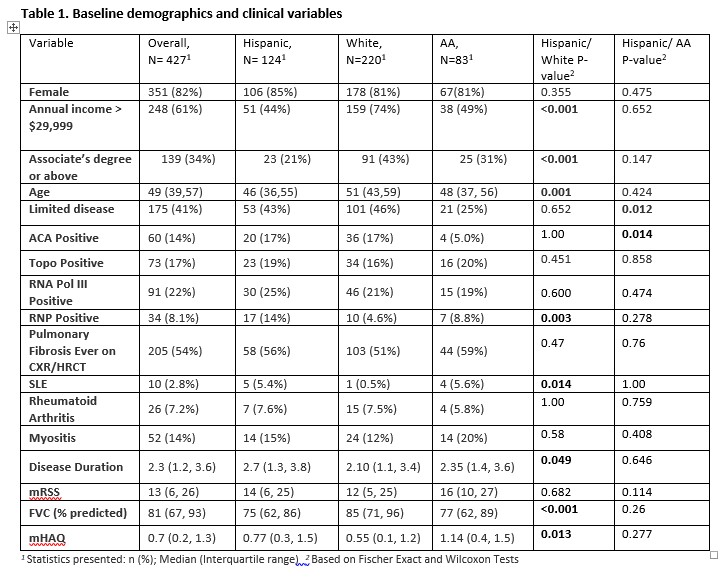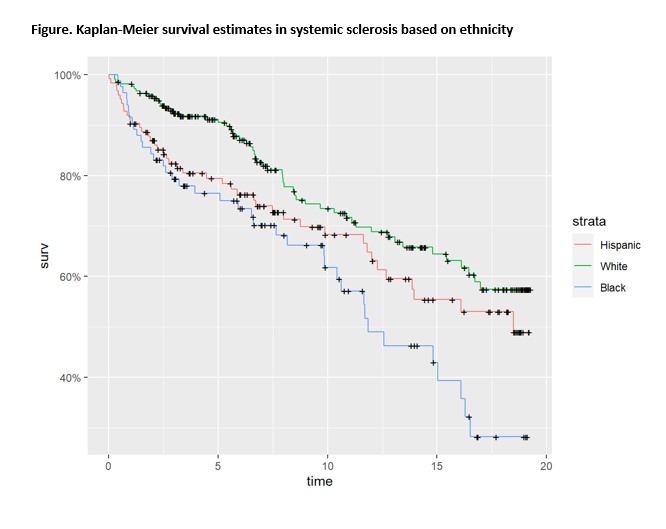Session Information
Date: Tuesday, November 9, 2021
Title: Systemic Sclerosis & Related Disorders – Clinical Poster III (1836–1861)
Session Type: Poster Session D
Session Time: 8:30AM-10:30AM
Background/Purpose: Systemic sclerosis (SSc) shows disparities in incidence, disease manifestations, and prognosis in different ethnic groups. The data regarding disease characteristics and outcomes in Hispanic Americans are scarce. Herein, we characterize SSc clinical features, antibody profile, and prognosis in Hispanic as compared to non-Hispanic White and African American (AA) patients.
Methods: Longitudinal clinical characteristics were collected prospectively in the Genetics versus Environment in Scleroderma Outcome Study (GENISOS) cohort. All patients fulfilled the ACR/EULAR Classification Criteria for SSc and had a disease duration less than five years at enrollment. Only patients with self-reported White, AA and Hispanic ethnicity were included in the present study. Mixed effect linear regression models were used to compare the longitudinal levels of modified Rodnan skin score (mRSS), Forced vital capacity % predicted (FVC%) and Health Assessment Questionnaire (HAQ) during the study period among three ethnic groups. Cox regression models were used for mortality analysis.
Results: A total of 427 patients, consisting of 124 Hispanic, 220 non-Hispanic White, and 83 non-Hispanic AA participants, were analyzed. The median follow-up time was 3.7 years. Table 1 shows the cross-sectional comparison of demographic and clinical characteristics of Hispanic patients to White and AA patients at the baseline visit. In comparison to Whites, Hispanic patients were significantly younger but had longer disease duration, had higher frequency of RNP positivity and an overlap disease with systemic lupus erythematosus (SLE), lower FVC%, and higher perceived functional disability (ie higher HAQ scores). Compared to AAs, Hispanic patients had more frequently limited cutaneous involvement and anti-centromere antibodies.
In the longitudinal analysis (FVC%: 1457, mRSS: 2239, and mHAQ: 1917 data points), Hispanic patients had significantly lower FVC% (point estimate=-9.3%, p< 0.001) than Whites but not AAs (p=0.6). Hispanic patients had similar serially obtained mRSS like Whites (p=0.9) but had lower longitudinal mRSS measurements than AA patients (point estimate = -3.2, p=0.029). Hispanic patients had significantly higher serially obtained perceived functional disability than White (point estimate=0.2, p < 0.001) but did not differ significantly from AA patients (p=0.6).
Hispanic patients had higher mortality than Whites (HR= 1.7, p= 0.011) after adjustment for age and gender but not in comparison to AAs (p=0.2) (also see Figure). As shown in Table 2, the higher mortality in Hispanic patients in comparison to Whites persisted even after adjustment for income and education levels.
Conclusion: SSc disease manifestations and prognosis differ in Hispanic American patients from other ethnic groups. Hispanic patients have higher likelihood of having RNP positivity and SLE overlap, lower lung volumes, as well as higher rate of mortality than White patients while they less frequently have diffuse cutaneous involvement and experience milder skin involvement than AA patients.
To cite this abstract in AMA style:
Jandali B, Lyons M, Charles J, Mayes M, Assassi S. Hispanic Patients with Systemic Sclerosis Have More Severe Disease and Higher Mortality: A Longitudinal Cohort Study [abstract]. Arthritis Rheumatol. 2021; 73 (suppl 9). https://acrabstracts.org/abstract/hispanic-patients-with-systemic-sclerosis-have-more-severe-disease-and-higher-mortality-a-longitudinal-cohort-study/. Accessed .« Back to ACR Convergence 2021
ACR Meeting Abstracts - https://acrabstracts.org/abstract/hispanic-patients-with-systemic-sclerosis-have-more-severe-disease-and-higher-mortality-a-longitudinal-cohort-study/



